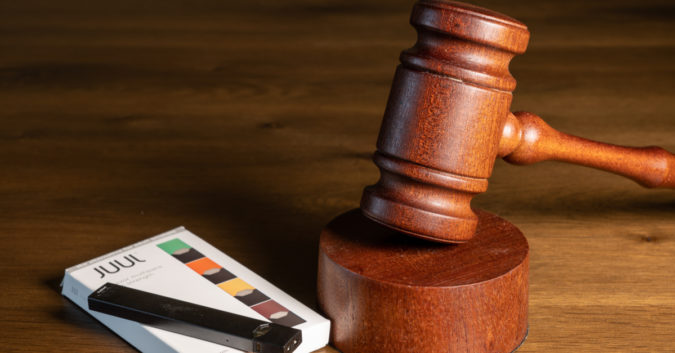When the first statistics about a surge in youth vaping came out, JUUL played dumb. They told state and federal health officials that they had no idea how so many underage kids discovered their product.
Most rational observers knew that JUUL was lying. Now they have proof.
JUUL Bought Banner Ads on Children’s Websites
Earlier this month, a lawsuit against JUUL filed by Massachusetts Attorney General Maura Healey provided “the first real window into JUUL’s original marketing plan.” Drawing on an investigation her office began in 2018, the state’s complaint alleges that:
“JUUL intentionally chose models and images that appealed to young people, that the company advertised its products on websites geared toward kids, and that JUUL shipped e-cigarettes to underage youth who ordered them directly from JUUL online.”
Compared to adults, minors are extremely susceptible to nicotine addiction, which comes with a host of lifetime health consequences and risks to their cognitive development. Even if children are able to quit — and experience suggests many will not — underage nicotine usage can leave lasting damage.
For all these reasons, advertising nicotine-based products to children is illegal. And yet that is exactly what JUUL did. It was cold, calculated, and it brought the upstart company some $3.3 Billion in sales. Healey and her team followed the money trail, and what they found will startle even the most jaded observer of contemporary corporate greed.
JUUL purchased ad space on children’s websites — not 1 or 2 times by accident, but as part of a deliberate campaign. The company made sure that banner ads of young, highly sexualized models and social media influencers appeared online where underage consumers could see them.
JUUL put tobacco products clicks away from minors on websites belonging to:
- Nickelodeon
- Nick Jr.
- Cartoon Network
In addition, JUUL purchased ads on other websites that were clearly designed for young boys and girls, such as:
- allfreekidscrafts.com
- hellokids.com
- kidsgameheroes.com.
- dailydressupgames.com
- didigames.com
- forhergames.com
- games2girls.com
- girlgames.com
- girlsgogames.com
Many of the ads JUUL purchased on these children’s websites emphasized their flavored vape products. For decades, it has been common knowledge that flavored tobacco attracts underage users. JUUL used that knowledge to successfully market kid-friendly flavors with cartoonish, cereal-box artwork directly to minors online.
Remember, when the youth vaping epidemic began to emerge, JUUL lobbied hard to keep selling their flavored products. Publicly, they said flavors were an important off-ramp for adult tobacco users. They probably thought no one would find out they were selling mango and other fruity nicotine-based products through Nickelodeon and the Cartoon Network.
JUUL Turned Down Marketing to Adults in Favor of Viral Youth Marketing
According to the complaint, before JUUL came on the market, e-cigarettes had a “significant but limited group of users” made up of former smokers. By 2015, the year JUUL launched, “the use and sales of e-cigarettes in the United States were decelerating or even declining.”
Perhaps this is the reason that JUUL turned down a marketing strategy that was clearly focused on finding traction with adult users.
The original campaign, which Healey’s investigation uncovered, featured older technologies that people in their 30s and 40s would remember — boomboxes, joysticks, unwieldy wireless phones and so on — alongside the new sleek JUUL vaping device with the message, “Everything changes, eventually.”
JUUL scrapped this campaign idea, however, and enlisted the help of celebrities and social media users who were popular among underage consumers, such as Miley Cyrus, Tavi Gevinson, Luka Sabbat. The highly sexualized, trendy, and completely illegal youth marketing campaign was extremely successful, and within several years of its launch, JUUL had millions of underage users.
JUUL Helped Minors Break State Tobacco Laws
The fact that minors were using JUUL products should have been obvious from the company’s social media accounts that were full of underage followers, and email marketing lists, which included high school email addresses. For JUUL to look the other way and allow minors to purchase their products was shameful, but the company took this bad behavior a step further.
One of the most sickening pieces of evidence brought to light is how JUUL helped consumers evade state and local tobacco laws. The complaint cited an email sent by a JUUL customer service representative to a consumer whose order was canceled due to an age verification failure. “Don,” from the “JUUL Care Team,” wrote:
“The legal age to purchase nicotine products in Milton, MA is 21 years old and above. If you have friends or relatives in Quincy, MA, you may use their address as a shipping address for your order.”
Instead of responsibly age-verifying consumers, JUUL gave advice about how to circumvent the laws. Fast forward to 2020 and America is in the middle of a youth vaping epidemic. Underage tobacco use is skyrocketing, and millions of children are using e-cigarettes, setting themselves up for a lifetime of nicotine addiction.
In that time, JUUL has enjoyed billions in revenue and captured 75% of the e-cigarette market. Now that the truth is out, it’s obvious that the company’s overnight success depended entirely on the lies they told to kids, parents, regulators, and lawmakers.
The only question now is: will they get away with it?
